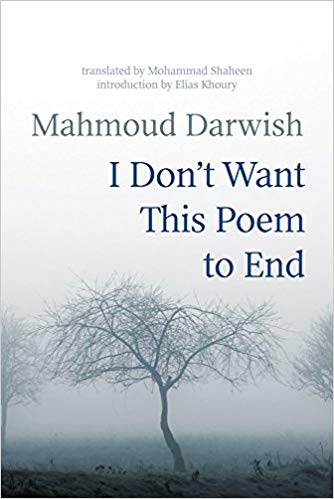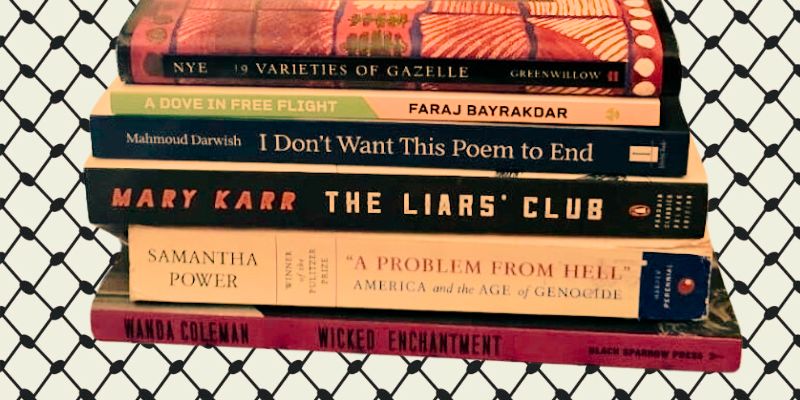In his powerful and harrowing essay in the New Yorker about his attempts to evacuate from Gaza during Israel’s devastating bombardment that has now continued for over a year, the Palestinian poet Mosab Abu Toha describes the needless humiliations and tortures exacted by the IDF on random Palestinian men like himself.
Article continues after advertisement
After a brief but scarring stint, Toha is told, “We are sorry about the mistake,” and released. “I learn from [my wife] Maram how lucky I was,” Toha writes. “She used my phone to inform friends around the world, who demanded my safe release. I think about the hundreds or thousands of Palestinians, many of them likely more talented than me, who were taken from the checkpoint. Their friends could not help them.”
LitHub and other venues provided public information about Toha’s confinement in order to put international pressure on Israel to secure his freedom. Toha and his family were on a list for evacuation only because his youngest son was born in the US during Toha’s studies here and has a US passport. After time in Cairo, he and his wife and children now live in Central New York.
In a recent interview with Nick Hilden in Al Jazeera, Toha described the “three pillars” required in Arabic poetry: rhyme, meter, meaning. Free verse in English was ultimately the form toward which Toha gravitated and employs when writing about his experiences, and his new collection Forest of Noise illustrates the ways in which American poetry, in particular, has had an impact on his work, with references from Audre Lorde, Walt Whitman, Yusef Komunyakaa, and others.
Carolyn Forché, in her introduction to Against Forgetting: Twentieth-Century Poetry of Witness, describes “conditions of extremity” as an essential quality for poets who “write poetry of witness.” She goes on: “[T]hose for whom the social had been irrevocably invaded by the political in ways that were sanctioned neither by law nor by the fictions of the social contract.”Forest of Noise certainly operates within Forché’s definition, describing the terror, grief, and longing Toha experienced during his lifetime in Palestine and beyond.
Indeed, the collection bears witness to the destruction and dehumanization of Palestinian life by the Israeli government that reach back generations—Toha, his parents, and grandfather were all born in a refugee camp. While these poems are undeniably powerful, the most moving piece in the collection, for me, is “Palestinian Village.” In it, Toha describes an idyllic village life with an endlessly singing canary in a pomegranate tree, “an earthworm breathing” in the nourished dirt, people gathering for tea made from herbs plucked from the garden.
He writes,
you can chock
the wheels of your vegetable cart
with a stone your grandfather once used
to crush thyme
Here, home is a place nourished and lived in for generations, a reality largely denied to Palestinians for three quarters of a century. The ache for such a life alongside the reality catches in your throat.
Toha tells us about his to-read pile,
I escape to books when everything around me fails to make sense. When I read books, I search for a bond between me and those who are thousands of miles away, geographically and historically. And that’s what I hope my own work does for others who have never been in my position, I, a Palestinian refugee and a survivor of countless air strikes and lately of the ongoing genocide, during which I lost not only my precious collection of books but more than thirty-one members if my extended family, some of whom, like my books, remain under the rubble since October 2023.
*

Naomi Shihab Nye, 19 Varieties of Gazelle: Poems of the Middle East
This stunning poetry collection was a Finalist for the National Book Award in Young People’s Literature in 2002, the judges’ citation for 19 Varieties of Gazelle describes figures in the book:
Fowzi, who beats everyone at dominoes; Ibtisam, who wanted to be a doctor; Abu Mahmoud, who knows every eggplant and peach in his West Bank garden; mysterious Uncle Mohammed, who moved to the mountain; a girl in a red sweater dangling a book bag; children in velvet dresses who haunt the candy bowl at the party; Baba Kamalyari, age seventy-one; Mr. Dajani and his swans; Sitti Khadra, who never lost her peace inside. Maybe they have something to tell us. Naomi Shihab Nye has been writing about being Arab-American, about Jerusalem, about the West Bank, about family all her life. These new and collected poems of the Middle East—sixty in all—appear together here for the first time.

Faraj Bayrakdar, Ammiel Alcalay (editor), Shareah Taleghani (editor), A Dove in Free Flight
Bayrakdar is a Syrian poet who published volumes in the late 1970s and early 80s until he was arrested and imprisoned for his membership to the Syrian Communist Labor Party. The simultaneously desperate and loving origins of this collection are described best in Words Without Borders (where you can read some of his work):
In 1987, Bayraqdar was arrested again and remained in prison without trial until 1993, when he was sentenced to fifteen years of hard labor for belonging to an unauthorized political association. His imprisonment lasted more than thirteen years, in three different prisons (the Palestine Division, Tadmor, and Saydnaya). Without his knowledge, a group of friends in Beirut published Dove in Free Flight, a collection of his poems that was used, Elias Khoury writes, as “one of the instruments of pressure on the Syrian authorities to mobilize international, intellectual opinion, particularly in France, in order to set the poet free.” After an international campaign was mounted on his behalf, Bayraqdar was released from prison during the brief political respite known as “Damascus Spring” in 2000.

Mahmoud Darwish, I Don’t Want This to End: Early and Late Poems
In its starred review, Publishers Weekly states,
This alluring volume comprising three poetry collections from acclaimed Palestinian poet Darwish (1941–2008), available in English for the first time, also features complementary correspondence and essays on the poet’s life, composition process, and activism…”He says to her as they gaze at a rose/ Which scratches the wall: death came a little nearer to me,” Darwish writes in the title poem. That these may have been among Darwish’s last words heightens the emotional impact of both the poem’s craft and the faultless translation. The image of the rose functions as an emblem for the possibility—of empathy, kindness, and enlightenment—that art opens within political life. By carefully framing Darwish’s poetry as the record of a citizen inhabiting the complexities of Palestine’s political landscape, Shaheen delivers a volume ideally suited to both scholars and newcomers to Darwish’s body of work.

Mary Karr, The Liars’ Club
“Mary Karr’s haunting memoir of growing up in East Texas in the early 1960s, virtually motherless, and fiercely seeking to understand her parents, their lives and their relationship to her sister and herself,” writes Sheila Ballantyne in the New York Times in 1995. “Ms. Karr’s narrative tone is less sensational than it is elegiac and searching. Yet the brutality that underlies both family and place is never really absent…It is almost as if in the Karr family, living in this hardscrabble place in Texas, such events, like the weather, are regarded as just the way things are.”
Karr is a poet who teaches at Toha’s alma mater for his MFA, Syracuse University. Her memoir was a national bestseller for a year, sold over 400,000 copies within that time. This outcome, despite her writing it because “I literally needed the money,” surprised Karr.
“If you’ve been a poet for twenty years,” she said in one interview, “you don’t expect anybody to read anything you write.”

Samantha Power, “A Problem from Hell”: American and the Age of Genocide
Power’s 2002 work earned her a slew of accolades: the Pulitzer Prize in Nonfiction, the NBCC, Robert F. Kennedy Award, among others. Anthony Holden, in his Guardian review of the book, opens with the origins of the term “genocide” in 1946 from a Jewish lawyer from Poland, Raphael Lemkin.
Power continues Lemkin’s mission by chronicling all the major twentieth-century acts of genocide in truly horrifying detail, while seeking to establish exactly how much the US administration of the day knew about what was going on as it invariably managed to avoid getting involved. “The United States has never in its history intervened to stop genocide,” she concludes, “and has, in fact, rarely even made a point of condemning it as it occurred.”
Holden goes on,
In the case of the US, as Power argues even more powerfully than we already knew, any overseas adventures have been dictated solely by national self-interest, usually more economic than moral. To this day, there are disagreements over the precise definition of genocide, flouting the UN declaration and largely designed to dodge any moral imperative to intervene.
Clearly worth a (re)read today.

Wanda Coleman, Wicked Enchantment: Selected Poems
Wanda Coleman looms large in the literary landscape of Los Angeles. During her life, she earned the title “LA’s unofficial Poet Laureate,” and was self-described as a “graduate magna cum laude from the University of the Streets.” Terrance Hayes writes of Coleman in Paris Review:
Amid a life of single motherhood, multiple marriages, and multiple jobs that included waitress, medical file clerk, and screenwriter, she made poems. She denounced boredom, cowardice, the status quo. Few poets of any stripe write with as much forthrightness about poverty, about literary ambition, about depression, about our violent, fragile passions.
Though there was word of Coleman’s illness prior to her death in 2013, I remember it stunned me. I had happened to share a table with her after a reading only a few months before. She was an absolute force.
Jarvis C. McInnis writes on Coleman’s creative work in Callaloo:
Although she initially set out to write long fiction, Coleman eventually settled on poetry: “I could finish a poem in a relatively short period of time and feel that I’d accomplished something”….A “catch-as-catch-can writer,” she composed poems while standing in line at the grocery store or waiting to get the car fixed.

Vladimir Nabokov, Speak, Memory: An Autobiography Revisited
While not in Toha’s photo, he asked I include it as it’s another book on his pile. In his introduction to this essay collection, Nabokov writes,
In the summer of 1953, at a ranch near Portal, Arizona, at a rented house in Ashland, Oregon, and at various motels in the West and Midwest, I managed, between butterfly-hunting and writing Lolita and Pnin, to translate Speak, Memory, with the help of my wife, into Russian…For the present, final, edition of Speak, Memory I have not only introduced basic changes and copious additions into the initial English text, but have availed myself of the corrections I made while turning it into Russian. This re-Englishing of a Russian re-version of what had been an English re-telling of Russian memories in the first place, proved to be a diabolical task, but some consolation was given me by the thought that such multiple metamorphosis, familiar to butterflies, had not been tried by any human before.
Bless his wife for helping him translate sentences as clause-laden as these!
